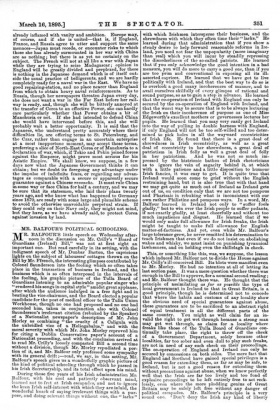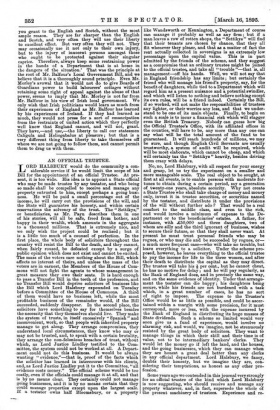MR. BALFOUR'S POLITICAL SCHOOLING.
MR. BALFOITR'S little speech on Wednesday after- noon in the discussion on Mr. Crilly's "Board of Guardians (Ireland) Bill," was not at first sight an important one. But read carefully in its setting, with the indignant speech of Mr. Dunbar Barton, the capricious lights on the subject of labourers' cottages thrown on the Bill by Mr. Ffrench, the interesting glimpses contributed by Colonel Saunderson into the fooling which so often takes place in the transaction of business in Ireland, and the business which is so often interposed in the intervals of the fooling, his graphic picture of the Tulla Board of Guardians listening to an admirable popular singer who "rendered his songs in capital style " amidst great applause, after which the audience indulged in a free fight and in beating the vice-chairman, and the Board elected a popular candidate for the post of medical officer to the Tulle, Union Workhouse, though no one had proposed and no one had seconded him, taken in conjunction also with Colonel Saunderson's irrelevant citation (rebuked by the Speaker) of a Nationalist newspaper's description of Mr. John Morley as combining "the cruelty of a Caligula with the unbridled vice of a Heliogabalus," and with the moral severity with which Mr. John Morley reproved him for citing a Dublin Conservative paper's account of a Nationalist proceeding, and with the conclusion arrived at to read Mr. Crilly's loosely compacted Bill a second time without a division, though Mr. Morley repudiated a por- tion of it, and Mr. Balfour only professed some sympathy with its general drift ;—read, we say, in this setting, Mr. Balfour's speech gives us a wonderfully graphic picture of the kind of political schooling through which he passed in his Irish Secretaryship, and its total effect upon his mind. During those five years of his Irish administration Mr. Balfour, with his cool and patiently observant mind, learned not to fret at Irish escapades, and not to ignore the keen Irish self-interest with which they are inlaid, the wonderful knack of saying irrelevant things with a pur- pose, and doing relevant things without one, the " larks " with which Irishmen intersperse their business, and the shrewdness with which they often time their " larks." He learned during that administration that if you show a steady desire to help forward reasonable reforms in Ire- land, you need not fear the unpopularity (more imaginary than real) which you will incur by steadily repressing the disorderliness of the so-called patriots. He learned that if you only acknowledge the good intention in a bad measure, you will do more to carry a good one, than if you are too prim and conventional in exposing all its ill- assorted caprices. He learned that we have got to live politically with Ireland, and that the best way to do so is to overlook a good many incoherences of manner, and to avail ourselves skilfully of every glimpse of rational and sound purpose, so as to gain a step in advance. He learned that the co-operation of Ireland with England can only be secured by the co-operation of England with Ireland, and that the worst way to secure that is to be always lecturing the Irish on their incoherence of purpose as one of Miss Edgeworth's excellent mothers or governesses lectures her pupils. He learned that you may very easily get Ireland into the way of pulling in double harness with England, if only England will not be too self-willed and too deter- mined to pick holes in all the wayward eccentricities of Irish life. He found that there is a great deal of shrewdness in Irish eccentricity, as well as a great deal of eccentricity in her shrewdness, a great deal of patriotism in Irish folly as well a great deal of folly in her patriotism. And he was not so much im- pressed by the histrionic bathos of Irish rhetoricians as to ignore the vein of sagacity behind it, at which with a little patience and a little disposition to humour Irish fancies, it was easy to get. It is quite true that Ireland would soon come to grief without the English restraining hand, but it is also true that with that hand we may get quite as much out of Ireland as Ireland gets out of us, on condition only that we are not too pompous and Pharisaic in rebuking what is inconsistent with our own rather Philistine and pompous ways. In a word, Mr. Balfour learned in Ireland not only to "suffer fools gladly," but to win over the Irish people to suffer pedants, if not exactly gladly, at least cheerfully and without too much impatience and disgust. He learned that if we would only make full allowance for Irish freaks, the Irish might be taught to make full allowance for English matter-of-factness. And yet, even while Mr. Balfour's large tolerance grew, he never remitted his determination to teach Irishmen that even if we do not insist on abolishing wakes and whisky, we must insist on punishing tyrannical lawlessness, and on holding even the shillelagh in check.
This, or something like this, was, we suppose, the lesson which induced Mr. Balfour not to divide the House against Mr. Crilly's ill-conceived Bill. Its blots were manifest even to Mr. Morley. He had no intention at all of letting its last section pass. It was a mere question whether there was enough in the Bill to approve, for a nominal second reading ; and Mr. Balfour thought there was. He thought that the principle of assimilating as far as possible the type of local government in Ireland to that in Great Britain, is a good principle, though he is determined not to concede that where the habits and customs of any locality show the obvious need of special guarantees against abuse, these guarantees are to be sacrificed to an abstract right of equal treatment in all the different parts of the same country. You might as well claim for an in- valid the right to get wet through because a strong man may get wet through, as claim for a locality where freaks like those of the Tulle. Board of Guardians con- tinually take place, the right to throw off the check of a Government Department, solely because other localities, far too sober and even dull to play such freaks, are not in need of any such check on their proceedings. The co-operation of England and Ireland can only be secured by concessions on both sides. The mere fact that England and Scotland have gained special privileges is a good reason for extending them, as far as may be safe, to Ireland, but is not a good reason for extending them without precautions against abuse, when we know perfectly well that the Irish are far too lively and too fond of explosive proceedings to be left entirely free to act reck- lessly, even where the more plodding genius of Great Britain may be safely left free without any danger of political escapades. Mr. Balfour's principle is a very sound one. Don't deny the Irish any kind of liberty you grant to the English and Scotch, without the most ample reason. They are far sharper than the English and Scotch, and very often they will use their liberty to excellent effect. But very often they will not. They may occasionally use it not only to their own injury, but to the injury of innocent persons amongst those who ought to be protected against their singular caprice. Therefore, always keep some restraining power in the hands of a Department that is at home in the dangers of the situation.' That was the principle at the root of Mr. Balfour's Local Government Bill, and we believe that it is a thoroughly sound principle. Even Mr. Morley's avowal that it would not do to give Boards of Guardians power to build labourers' cottages without retaining some right of appeal against the abuse of that power, seems to imply that Mr. Morley is not far from Mr. Balfour in his view of Irish local government. We only wish that Irish politicians would learn as much from their experiences of England as Mr. Balfour has learned by his experiences of Ireland. If they had learned as much, they would not press for a sort of emancipation from the restraints of united action which they perfectly well know that England cannot, and will not, grant. They have,—and use,—the liberty to call our statesmen Caligula and Heliogabalus at pleasure ; but that is a very different thing from liberty to take themselves off where we are not going to follow them, and cannot permit them to drag us with them.



































 Previous page
Previous page